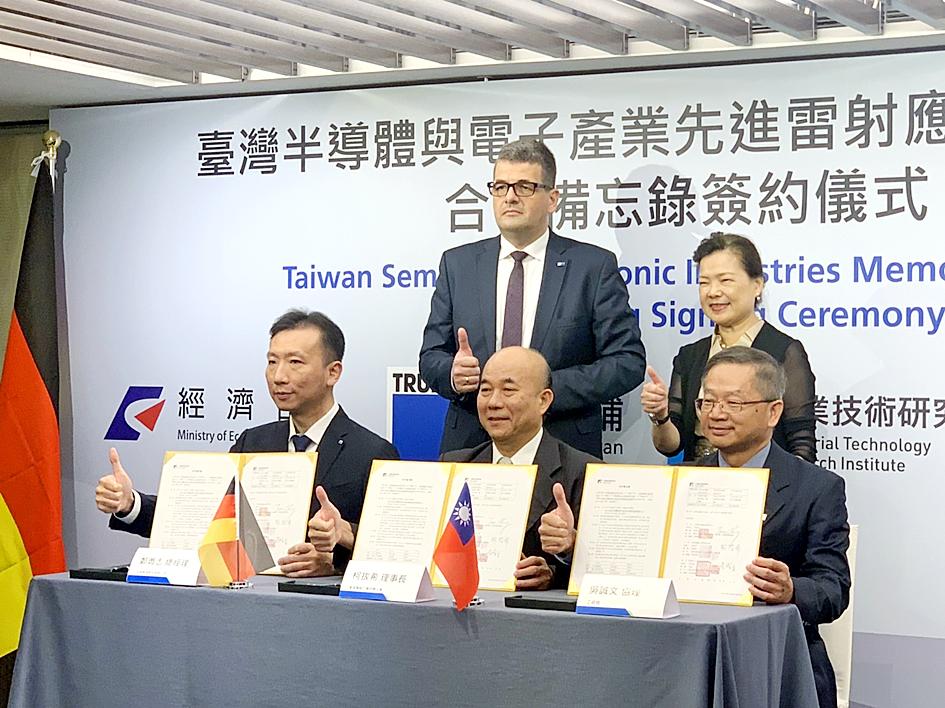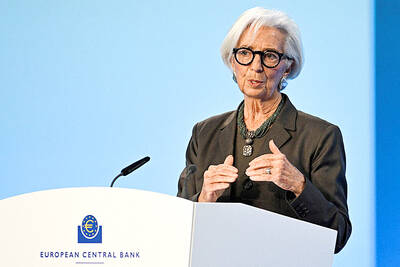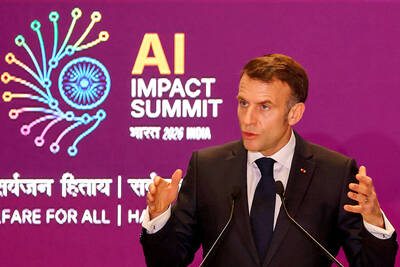Germany-based Trumpf Group, which specializes in machine tools and laser technology, is to work with the Industrial Technology Research Institute (ITRI, 工業技術研究院) to establish a Taiwan Laser Application Center in Tainan.
Representatives from Trumpf, ITRI and the Association of Machinery Industry (TAMI, 台灣機械公會) yesterday signed a memorandum of understanding at a press event in Taipei, which was also attended by Minister of Economic Affairs Wang Mei-hua (王美花) and German Trade Office Taipei executive director Axel Limberg.
The proposed center would give Taiwanese manufacturers easier access to laser components, Art Liao (廖金二), a manager at the Hsinchu-based ITRI, told the Taipei Times by telephone, adding that such components must currently be imported.

Photo: Wang Yi-sung, Taipei Times
“If we imagine laser equipment being a car, the laser source, which is like the engine, is provided by Trumpf,” Liao said. “ITRI will provide the optical components, which are equivalent to a car’s transmission, and the manufacturers make the chassis.”
ITRI has facilities to make optical components, but Taiwanese companies rely on imports from countries such as Germany, England and Japan for mass production, he said.
“Imagine if the wafer made by Taiwan Semiconductor Manufacturing Co (台積電) is a cake. We use a laser to cut the cake into smaller pieces, and package and sell them, maybe with different toppings,” he said.
Referring to high-precision 5G equipment, Liao said that the smaller and more precise the pieces, the more profitable the product would be.
TAMI chairman Alex Ko (柯拔希) said that access to high-end laser sources would open the door to a large range of applications and give the domestic industry a massive boost.
“At first, we thought that we would be using lasers for cutting, measuring and maybe 3D printing, but then we realized the applications for precision cutting in the semiconductor industry is enormous. We are still a little behind our international competitors, so we have to figure out how to close the gap,” Ko said.
Improving the quality of Taiwanese products is key to making the industry more competitive globally, Ko said.
“One laser cutter for the semiconductor industry is worth more than 100 of the products we are exporting. Imagine if those laser cutters can all be made in Taiwan and be exported around the world?” he said.
Wang — who visited Trumpf’s headquarters in September last year — said the German firm would be a powerful partner for the development of Taiwan’s laser equipment industry.
Trumpf is among the world’s top three laser source makers and the main supplier of Dutch semiconductor equipment maker ASML Holding NV’s extreme ultraviolet photolithography systems, she said.
“I am convinced that this center will make a significant contribution to the development of Germany-Taiwan economic relations,” Limberg said. It would also serve as “a critical step in upgrading equipment and technology of Taiwan’s semiconductor industry.”

European Central Bank (ECB) President Christine Lagarde is expected to step down from her role before her eight-year term ends in October next year, the Financial Times reported. Lagarde wants to leave before the French presidential election in April next year, which would allow French President Emmanuel Macron and German Chancellor Friedrich Merz to find her replacement together, the report said, citing an unidentified person familiar with her thoughts on the matter. It is not clear yet when she might exit, the report said. “President Lagarde is totally focused on her mission and has not taken any decision regarding the end of

French President Emmanuel Macron told a global artificial intelligence (AI) summit in India yesterday he was determined to ensure safe oversight of the fast-evolving technology. The EU has led the way for global regulation with its Artificial Intelligence Act, which was adopted in 2024 and is coming into force in phases. “We are determined to continue to shape the rules of the game... with our allies such as India,” Macron said in New Delhi. “Europe is not blindly focused on regulation — Europe is a space for innovation and investment, but it is a safe space.” The AI Impact Summit is the fourth

CONFUSION: Taiwan, Japan and other big exporters are cautiously monitoring the situation, while analysts said more Trump responses ate likely after his loss in court US trading partners in Asia started weighing fresh uncertainties yesterday after President Donald Trump vowed to impose a new tariff on imports, hours after the Supreme Court struck down many of the sweeping levies he used to launch a global trade war. The court’s ruling invalidated a number of tariffs that the Trump administration had imposed on Asian export powerhouses from China and South Korea to Japan and Taiwan, the world’s largest chip maker and a key player in tech supply chains. Within hours, Trump said he would impose a new 10 percent duty on US imports from all countries starting on

STRATEGIC ALLIANCE: The initiative is aimed at protecting semiconductor supply chain resilience to reduce dependence on China-dominated manufacturing hubs India yesterday joined a US-led initiative to strengthen technology cooperation among strategic allies in a move that underscores the nations’ warming ties after a brief strain over New Delhi’s unabated purchase of discounted Russian oil. The decision aligns India closely with Washington’s efforts to build secure supply chains for semiconductors, advanced manufacturing and critical technologies at a time when geopolitical competition with China is intensifying. It also signals a reset in relations following friction over energy trade and tariffs. Nations that have joined the Pax Silica framework include Japan, South Korea, the UK and Israel. “Pax Silica will be a group of nations